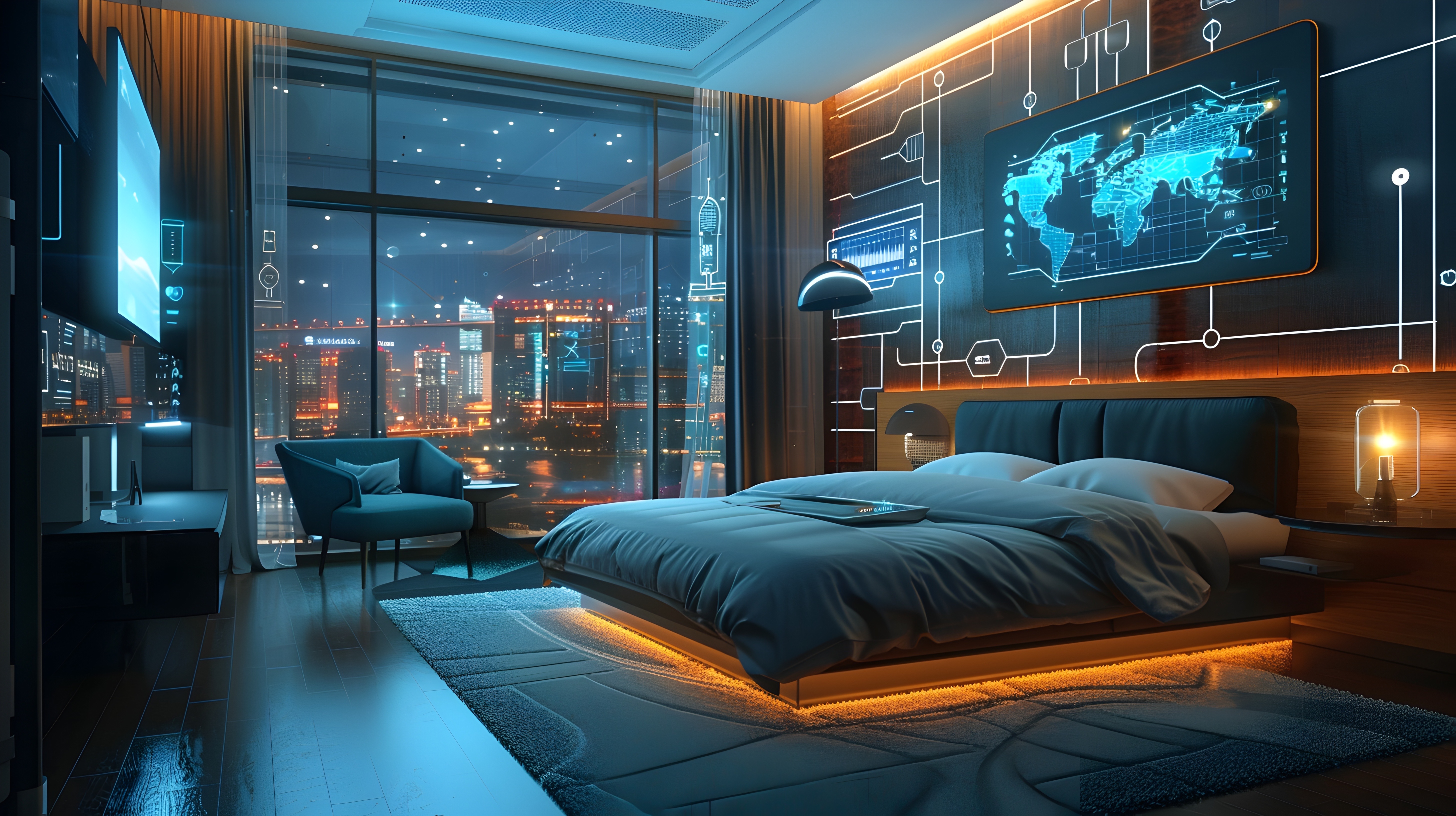Hospitality and technology are like peanut butter and jelly - they're even better together. Think back a decade or two ago: checking into a hotel involved stacks of paperwork and a line of grumpy travelers. Now, thanks to new technology in hospitality, it can be as easy as a tap on your phone.
This isn’t just about making things easier; it's revolutionizing how we experience travel and leisure. But where is this high-speed train of innovation taking us? And how can the hospitality industry make the most of emerging technologies in hospitality without getting left behind? Buckle up, this ain't your grandma's hotel brochure, we're diving into the wild world of hospitality and technology.
Table Of Contents:
- The Power of AI: No, Not the Terminator Kind
- Robots: Beyond the Maid Service
- Redefining Luxury With Technology in Hospitality
- FAQs about Hospitality and Technology
- Conclusion
The Power of AI: No, Not the Terminator Kind
Let's talk about AI. Now, I don't mean robots taking orders at your local diner. I’m talking about the AI that’s already changing the game behind the scenes. According to a GlobalData report, the global AI market is expected to reach $383.3 billion by 2030.
This kind of growth shows the potential AI has across multiple industries, and the hospitality sector is definitely catching on. AI in the travel world might feel futuristic, almost Jetsons-like. But AI can be the best employee you never had to hire.
Making Sense of Data with Predictive AI
Imagine being able to predict what your customers want before they even ask. That’s the power of predictive AI, and in hospitality and technology, it's pure gold. Hoteliers are catching on to this, with IDC reporting over 40% of AI investments leaning toward this powerful tool.
What does this look like in practice? Think targeted promotions sent to guests' phones at just the right moment or personalized room suggestions based on past preferences. AI can analyze mountains of data, like booking history, social media activity, and even staff shortages, to anticipate your needs.
Chatbots: The Future of Customer Service is Now
We’ve all been there - stuck on hold, listening to elevator music, just trying to get a simple question answered. AI-powered chatbots and machine learning can fix that.
When done right, a chatbot offers several customer service benefits. It isn't just cost-effective; it's the friendly face of your business that never needs a coffee break. Companies like TUI Group are proving just that. By implementing a chatbot into their app, TUI found their customers were actually getting helpful and even personalized responses, 24/7.
Robots: Beyond the Maid Service
Okay, let’s talk robots. No, not the sci-fi overlords vying for world domination – though sometimes it feels that way with how quickly technology moves. I'm talking about the super practical, task-tackling machines popping up in hotels across the globe.
Remember that viral video of the robot delivering snacks to a hotel room? Super cool, but definitely gave off strong “this is replacing my job” vibes. But a Deloitte study threw some cold water on those fears. Only a third of hotels surveyed thought robots would reduce staff in the next five years. These robots are more like helpful sidekicks, letting staff focus on human connection and guest service.
Hospitality Robots and Their Use Cases
| Robot Type | Use Case Example | Benefit |
|---|---|---|
| Concierge Robot | Providing directions, answering guest queries, offering recommendations. | Improved guest experience, 24/7 availability, reduced workload on human staff. |
| Cleaning Robot | Vacuuming, mopping, sanitizing surfaces, especially in large, high-traffic areas. | Increased efficiency, improved hygiene standards, freeing up staff for other tasks. |
| Delivery Robot | Delivering room service, luggage, or amenities to guest rooms. | Enhanced guest experience, increased efficiency, contactless delivery option. |
| Kitchen Assistant Robot | Performing repetitive kitchen tasks, such as chopping vegetables or preparing simple dishes. | Increased efficiency, improved food safety, reduced labor costs. |
These real-world uses highlight how robots can streamline operations without stealing everyone's jobs. But as robots get more intelligent, things are going to get interesting. Will a robot be able to flawlessly whip up a cappuccino AND engage in witty banter about the weather? Stay tuned to find out.
Redefining Luxury With Technology in Hospitality
When we think luxury, we often imagine sprawling marble lobbies, chocolates on the pillow… You know, the classics. But now, luxury is getting a serious upgrade pushed by technology trends and, you guessed it - hospitality technology.
Some hotels have iPads controlling the lighting, temperature, and room controls. Imagine the convenience of not having to call the front desk every time you need an adjustment. These modern technologies in the hospitality industry take guest experience to a whole new level.
The Mobile Guest Journey: Smoother Than a First-Class Upgrade
A smooth and enjoyable guest experience goes beyond simply booking a room or ordering room service. Nowadays, people crave personalized and engaging interactions from the moment they start planning their trip until they check out and head back home. That's where the mobile guest journey comes into play.
Imagine having an app that not only lets you check in but also unlocks your room door, controls the room temperature, or even lets you request extra towels, all with a few taps on your phone. A recent 2023 survey by Hospitality Tech found that 69% of hoteliers are bumping up their tech budget to integrate those very technologies. This increases efficiency for staff and leverages innovation connecting hospitality and technology.
Data Privacy and Security: Keeping Up With the Innovation Joneses
Technology has a knack for moving at the speed of light, but there’s a crucial aspect we can’t leave behind in this mad dash for the future: Data privacy and cybersecurity. In our hyper-connected world, data breaches and hacks are more common than we'd like.
After the high-profile MGM Resorts Data Breach in 2020 where personal data from over 10 million guests was leaked, the hospitality industry received a harsh wake-up call. No longer are we simply competing to create the ‘coolest’ hotel experience. We’re competing for customers' trust by prioritizing their security.
FAQs about Hospitality and Technology
FAQ 1: How does technology relate to hospitality?
Answer 1: Technology and the hospitality industry go hand in hand. From online booking platforms and mobile check-ins to smart room controls and AI-powered concierge services, technology is transforming how we experience travel and leisure. It enables hotels and restaurants to provide personalized experiences, enhance efficiency, and improve guest satisfaction. As hospitality technology continues to advance, we can expect even more innovative solutions to enhance the hospitality industry.
FAQ 2: What is hospitality management and technology?
Answer 2: Hospitality management and technology focus on utilizing technology to manage various aspects of the hospitality industry. It involves using software, hardware, and digital platforms to streamline operations, improve guest experiences, and make data-driven decisions. Hospitality management technology encompasses areas such as property management systems, revenue management, customer relationship management, and more.
FAQ 3: What are the new technologies in hospitality?
Answer 3: The hospitality industry is rapidly adopting new technologies to enhance its offerings. Some of the latest technology trends in the hospitality industry include:
- Artificial intelligence (AI) for personalized recommendations, chatbots, and predictive analytics.
- Internet of Things (IoT) for smart room controls, energy management, and enhanced guest experiences.
- Virtual Reality (VR) and Augmented Reality (AR) for virtual tours, immersive experiences, and destination previews.
- Mobile apps for contactless check-in, room service orders, and personalized communication.
- Robotics for automating tasks, such as cleaning, delivery, and guest assistance.
FAQ 4: What is technology integration in the hospitality industry?
Answer 4: Technology integration in the hospitality industry refers to the seamless incorporation of technology solutions into various operational aspects. It involves connecting systems, data, and processes to create a unified and efficient workflow. By integrating technology, hospitality businesses can enhance communication, automate tasks, improve guest services, and gain valuable insights from data analytics.
Conclusion
So, what does the future hold for hospitality and technology? While we’re still a few inventions away from self-making beds and robotic bartenders that can tell a good joke (although who knows, that could be coming sooner than we think), it's clear technology has completely reshaped our travel experiences. Technology trends in the hospitality industry shows no sign of slowing down anytime soon.
Whether that means dipping your toes in the world of AI-powered chatbots or simply upgrading your property's Wifi, there's a technological tool ready to solve specific hospitality challenges. By embracing the power of innovation and placing customers at the forefront, the future of hospitality promises to be brighter, smoother, and even more enjoyable for everyone.




SHARE